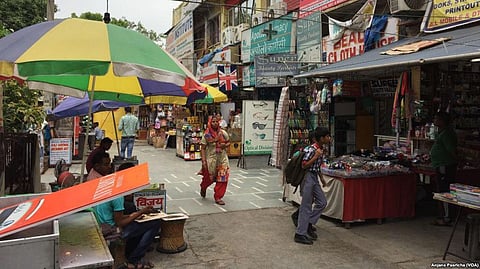
- Home
- NewsGram USA
- India
- न्यूजग्राम
- World
- Politics
- Opinion
- Entertainment
- On Ground
- Culture
- Lifestyle
- Economy
- Sports
- Sp. Coverage
- Misc.
- NewsGram Exclusive
- Jobs / Internships
- Interview

– By Naina Mishra
July 3, 2017: The revised GST rate list has yet again proved to be patricentric and ignored the natural process that leads to motherhood – "Menstruation". With levying 12% tax on sanitary napkins, it evinced that menstrual hygiene of the 355 million women is still not the concern of the policymakers. What's intimidating is the depiction of an Indian Woman in the society. Exemption of kumkum, sindoor, bindis, alta and bangles from tax exemplifies a picture of the ideal Indian woman as a visibly married Hindu woman in India.
In India, Menstrual hygiene still remains to be the most challenging developmental issues today. Regarded as a deep taboo, menstruation is a crafted illusion of myths and misinformation and thus inherently judged as shameful, gross and weird. Women and girls often times lack access to hygienic sanitary materials necessary for good menstrual hygiene. It is estimated that over 20 percent of girls drop out of school completely after reaching puberty.
Indirect taxation is classified into essential and luxury goods, and labeling sanitary pads as the luxury item, not admitting its essential attribute in myriads of women's life is another critique of the revised GST rate list. The arguments on taxing sanitary pads keep on mounting that the product was not inborn or domesticated in India. Cotton rags conversely can be used as an alternative if used with discretion and washed properly. However, such basis cannot deny the access to basic menstrual sanitation facility to the women.
A study by AC Nielsen titled, "sanitary Protection reveals only 12 % of India's 355 million women use sanitary napkins. Over 88% of women resort to unsafe alternatives like un-sanitized cloth, ashes and husk sand. Incidents of Reproductive Tract Infection (RTI) are 70% more prevalent among these women. The biggest challenge to using a Sanitary Napkins in India is the affordability owing to which 88% of women use old fabric, rags or sand to manage their menstrual flow.
Lately, Delhi Commission of Women Chairperson Swati Maliwal wrote to the Union Finance Minister Arun Jaitley: "The better half of our population has been bestowed with the gift of motherhood and in this process, all females from the tender age of 10-12 years till 45-50 years face monthly menstruation. Since menstruation is a natural phenomenon, hygiene, and proper health during this period is a natural fundamental right of each female citizen of this country. However, sanitary napkins which are critical for the health and hygiene of millions of women are presently taxed."
Not only this, there have been similar attempts in the past by Sushmita Dev, Member of Parliament, who launched a petition to Finance Minister Arun Jaitley for removal of tax on sanitary napkins.
Sushmita Dev with Finance Minister Arun Jaitley concerning petition
The highlights of the petition were affordability, accessibility, and availability of sanitary napkins to the Indian women. The petition deemed the tax unfair because of the underlying fact – women being taxed 12 months a year, for about 39 years on a process they have no control over. The petition gained three lakh supporters in its due course.
The petition was also signed by Maneka Gandhi, Union Minister for Women and Child Development.
Maneka Gandhi supporting the Tax free wings petition
She stated, "I strongly believe a tax exemption for sanitary pads will also bolster the Honourable Prime Minister's "Beti Bachao, Beti Padhao" and "Swachh Bharat" initiatives. This will also encourage more girls to continue their school education and more women to participate in the workforce."
